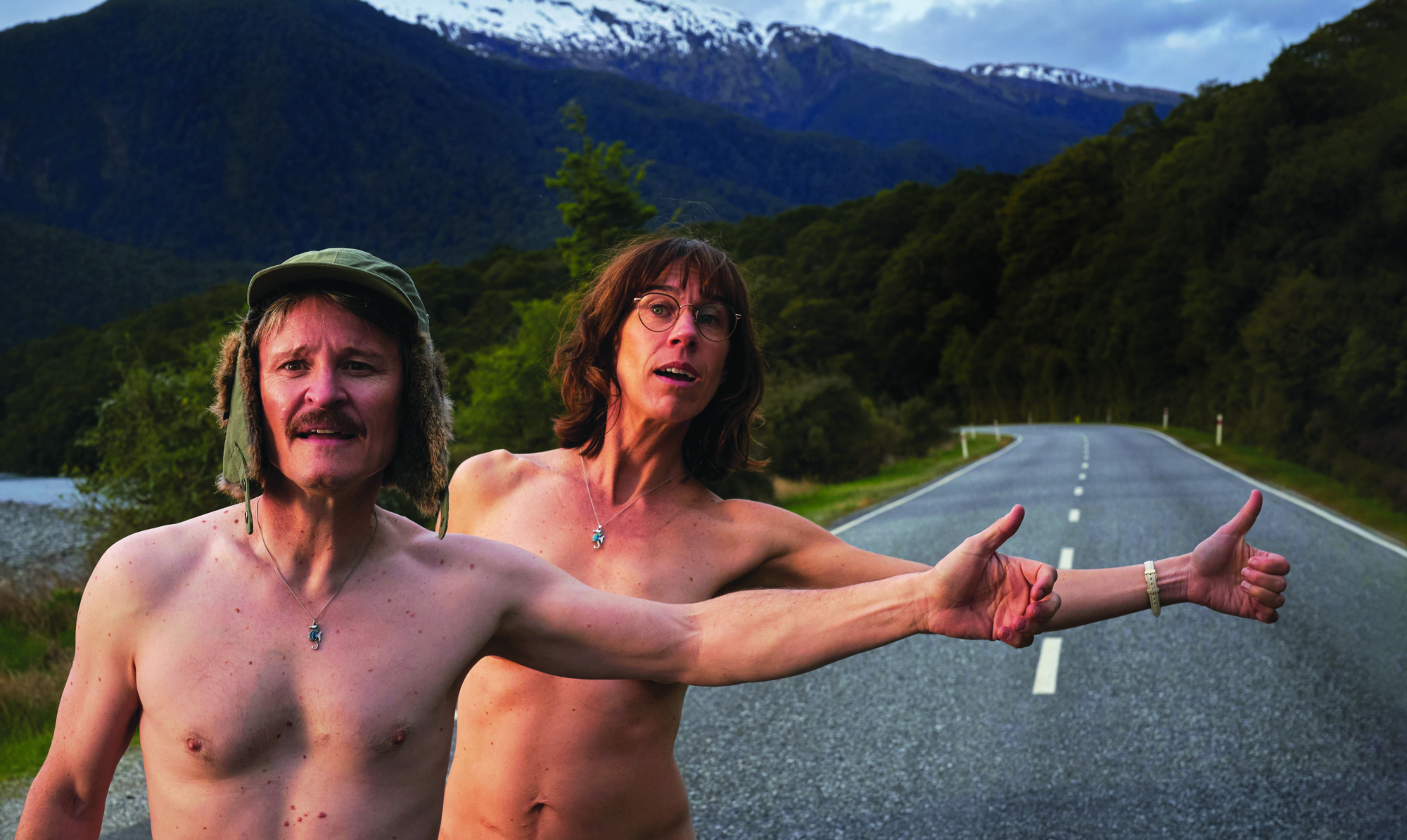The improvisatory comedy television program Whose Line Is It Anyway? – in both its current long-running US iteration and the original (far superior) UK version that screened in the 1980s and 1990s – features a game called ‘Foreign Film Dub’. The idea is that two participants are instructed to perform a scene from a made-up film whose title and language – for instance, German or Russian – have been suggested by the audience. The performers do not speak the actual language, however; instead, they communicate in a made-up nonsense tongue intended to mimic it phonetically. Meanwhile, two other performers are positioned off camera, ‘dubbing’ the dialogue into English for the audience after each line their counterparts deliver – naturally, with hilarious consequences.[1]Many clips of this game from both versions of the show can be found on YouTube. For example, see ‘Foreign Film Dub (Italian, Farewell My Porcupine) – Whose Line UK’, YouTube, 15 September 2016, <https://www.youtube.com/watch?v=nacBB91KScE>, accessed 18 July 2022.
Nude Tuesday (Armağan Ballantyne, 2022) is, in some senses, a feature-length extension of this premise. The film was shot with its actors speaking in unintelligible gibberish throughout, adhering to a script with a clear plot trajectory that can mostly be grasped even without understanding the dialogue. Ballantyne then handed the film over to two separate parties to write different sets of subtitles: the first, a collaboration by Australian comedians Celia Pacquola and Ronny Chieng; the second, written by British comedian Julia Davis. The result is that two separate versions of the film are available[2]There is also a third version available on streaming service Stan without any subtitles at all, allowing viewers to ‘improvise with family and friends’. See Brad Newsome, ‘“Extraordinary TV”: This True-crime Drama Should Be on Your Must-watch List’, The Sydney Morning Herald, 6 July 2022, <https://www.smh.com.au/culture/tv-and-radio/extraordinary-tv-this-true-crime-drama-should-be-on-your-must-watch-list-20220701-p5aya6.html>, accessed 28 July 2022. – identical visually, but with the differing subtitles bringing contrasting characterisation, motivations, sources of comedy and overall tone.
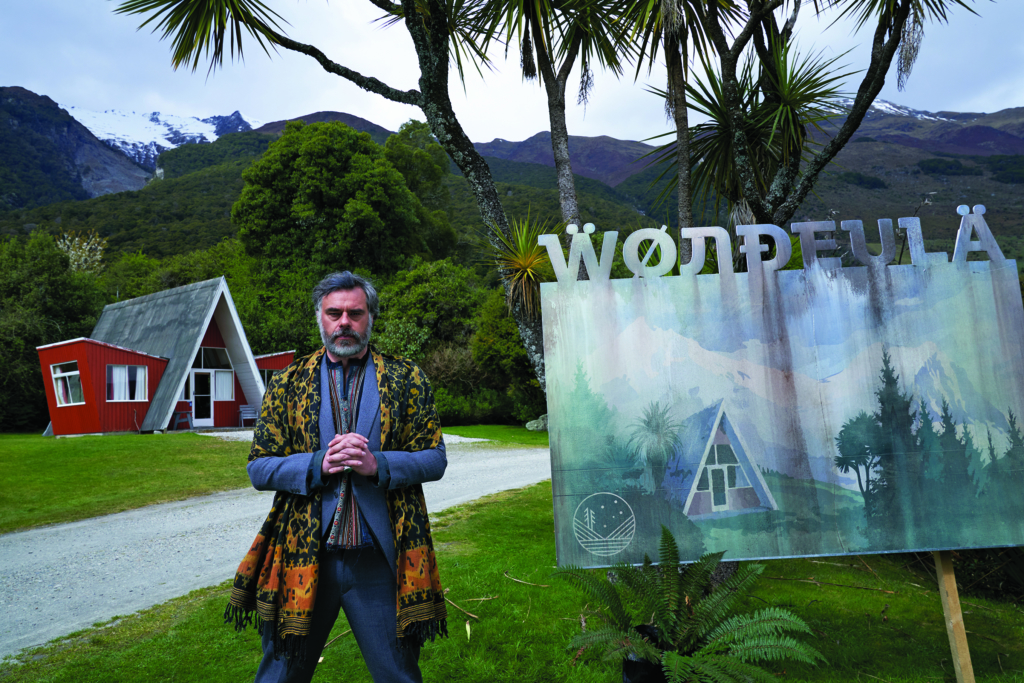
Unlike all other aspects of the film, which was shot in New Zealand, the plot of Nude Tuesday is nothing particularly unconventional. Set in the fictional Pacific nation of Zǿbftąņ[3]The language of Nude Tuesday has been referred to as ‘Zøbftańlik’. See Sam Brooks, ‘The Story of Zøbftańlik, Nude Tuesday’s 100% Fake Scandinavian Language’, The Spinoff, 18 June 2022, <https://thespinoff.co.nz/tv/18-06-2022/the-story-of-zobftanlik-nude-tuesdays-100-fake-scandinavian-language>, accessed 23 July 2022. – as we are told via an opening shot of a map, complete with real place names in this invented language (Ǿǿstrălā, Nû Zląnd) – Laura (played by Jackie van Beek, who also wrote the screenplay) and Bruno (Damon Herriman) are a married couple in early middle age, with two young daughters. Their life together is bland, and they are frustrated with themselves, each other and their respective careers. Resentment between them is growing stronger. This is a typical portrait of suburban, middle-class ennui.
It is the occasion of their wedding anniversary, and, during a celebratory dinner, Bruno’s mother, Helene (Brenda Kendall), gifts the couple a stay at a special mountain retreat designed to foster intimacy and improve participants’ sex lives. Off Laura and Bruno go, and the adventures (including the titular ‘nude Tuesday’), challenges and realisations they experience there make for an enjoyable, if at times predictable, comedy.
The ‘language’ employed here has a distinctly Nordic essence to it, evocative of Danish or Swedish[4]The language was formed by van Beek in collaboration with actor and voice coach Perry Piercy, taking inspiration from Scandinavian languages as well as dialects created for fantasy or sci-fi books, film and television, such as Elvish (The Lord of the Rings) and Dothraki (Game of Thrones). See ibid. – a nod to the ubiquity of the many critically adored TV series and films from that part of the world, and perhaps a good-natured parody of them. That said, this tongue appears to be flexible; in the mouths of some actors, it comes across with French-sounding inflections, or even Russian elements. Either way, every actor who is required to speak in this way deserves immense credit for making the gobbledegook sound plausible. Each viewer, most likely, will have their own cultural reference points that this language play reminds them of; for me, apart from Whose Line Is It Anyway?, it recalled the nonsense talk of the Swedish Chef from The Muppet Show, along with the Middle English of Geoffrey Chaucer’s The Canterbury Tales (the last of these also comparable because of its abundance of sexual humour). The film’s language, while being ridiculous, somehow has its own structure, rhythms and music; it is impressively convincing. It also runs deep in the film’s world-building: along with the aforementioned map, the film’s soundtrack features well-known pop songs rerecorded with lyrics in Nude Tuesday’s language, highlights being versions of The Zombies’ ‘Time of the Season’ and the Bee Gees’ ‘Islands in the Stream’.
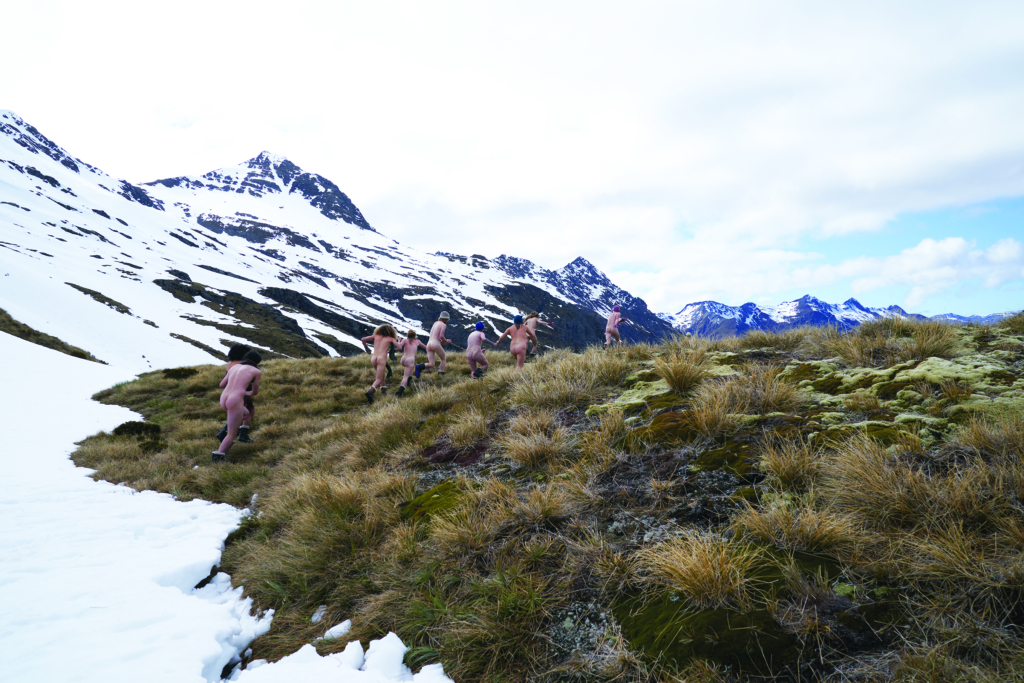
‘Greensleeves’, the sixteenth-century traditional English folk tune, is also featured in various forms – including as learned by Laura and Bruno’s two daughters and sung by them during the couple’s anniversary celebrations. This song is an intriguing inclusion that links to several of the film’s themes and scenes. For example, one interpretation of its title is that it refers to sexual relations taking place outdoors[5]See Ian Pittaway, ‘Greensleeves: Mythology, History and Music. Part 1 of 3: Mythology’, Early Music Muse, 3 July 2015 <https://earlymusicmuse.com/greensleeves1of3mythology/>, accessed 23 July 2022. – and there is plenty of that in Nude Tuesday. And green is a dominant colour in the film, set as it is for the most part among the verdant forests and mountains of New Zealand’s Queenstown Lakes District. There is also a connection to Chaucer: in a note accompanying his translation of The Canterbury Tales, literary scholar Nevill Coghill states that, in its author’s age, green represented the colour of ‘lightness’ – or fickleness – in love, and links this connotation to ‘Greensleeves’.[6]Nevill Coghill, ‘Notes’, in Geoffrey Chaucer, The Canterbury Tales, trans. Coghill, Penguin Classics, London, 1952, p. 517. It’s a shame and a missed opportunity, then, that neither Pacquola and Chieng nor Davis opted to subtitle the new nonsense lyrics when the girls sing ‘Greensleeves’.
Of the two versions of the film, Pacquola and Chieng’s is the superior by some way. Davis’ subtitles soon become tiresome in their over-reliance on crude sexual humour, to the extent that her translation threatens to become the film’s focal point; it is as if her own ‘performance’ is seeking to draw attention to itself. Its bawdiness is, on a few occasions, very funny, but more often feels forced and even cynical. This version’s more chaotic approach also creates a couple of minor continuity problems. Davis’ more outlandish and coarse subtitles, often veering into absurdism, really do make the film feel like that Whose Line Is It Anyway? game (which, granted, might appeal to some viewers).
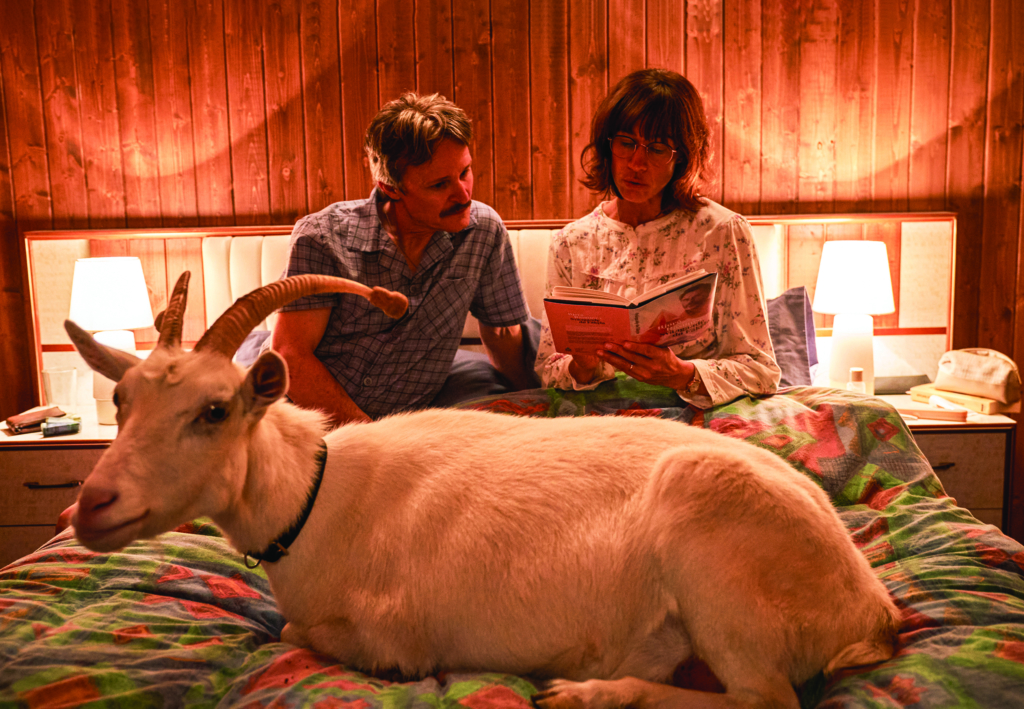
In contrast, Pacquola and Chieng’s subtitles have a more reciprocal relationship with the film’s narrative trajectory: supporting it with something very simple and obvious when necessary, and enhancing it with a dryer, more nuanced wit than what is offered in the Davis version. There is a relaxed, understated tone to this iteration of Nude Tuesday, and it makes for a better film. Fans of Rosehaven, the ABC comedy series Pacquola co-wrote and starred in with Luke McGregor, will appreciate many lines here – in fact, some could almost be quips her Rosehaven character, Emma, might make. Two examples that come early in the film stand out. Firstly, Laura is late for a work presentation, prompting her boss (Paul Glover) to make an excuse to the clients: ‘There was a fire at her kids’ school. A teacher lit it.’ Another line that feels reminiscent of Rosehaven comes when Laura’s parents arrive for the anniversary dinner and, while still at the front door, ask their daughter about her plans to undergo a hysterectomy, which Laura tells them is now no longer happening. ‘Glad you kept your uterus,’ says her father (Roy Billing). Over dinner, Laura’s mother (Sarah Peirse) responds to the gift of the retreat with the line: ‘Two tickets to Jonestown. Hippy nonsense.’ These examples give an indication of the subtler style of wit on show in Pacquola and Chieng’s subtitles compared with the version written by Davis, in which jokes about anuses, defecation and genital infections abound.
The framework of this invented language, while fascinating – and perhaps one day even worthy of scholarly study, in terms of semiotics and semantics in cinema – is not enough to sustain a 100-minute film (Nude Tuesday is probably about fifteen minutes too long). The question becomes, then, what it offers beyond this. The film is a relatively conventional – yet never dull – sex comedy. Throughout, there are echoes of the films of Woody Allen that most embrace farce, such as A Midsummer Night’s Sex Comedy (1982) and Everything You Always Wanted to Know About Sex *but Were Afraid to Ask (1972). There is also something particularly reminiscent of the characters Allen plays in Bruno, a repressed, angry, petty and insecure character for most of the film. Elsewhere, the many group scenes at the retreat – with the communal breathing and ritualised groaning – recall the famous opening scenes of one of the high watermarks of the sex comedy genre, Bob & Carol & Ted & Alice (Paul Mazursky, 1969), which also features a mountain retreat devoted to sensuality and, as in the late stages of Nude Tuesday, plenty of nudity.
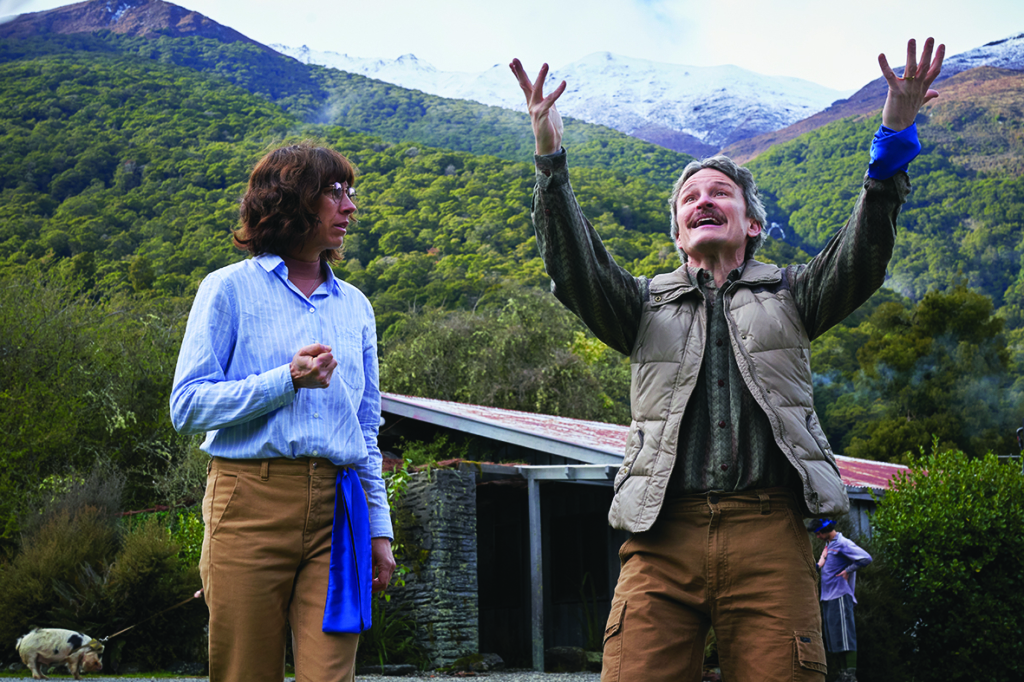
Van Beek and Herriman are superb as the couple whose marriage is treading water; both characters are bewildered, belligerent and tender at different times, with the actors seamlessly inhabiting this bizarre acting environment. Another outstanding (and extravagant) performance comes from Ian Zaro as Rufus, a fellow retreat attendee who initially feuds with Bruno before the two take psychedelic mushrooms together. But the centrepiece performance of Nude Tuesday undoubtedly comes from Jemaine Clement in the role of retreat leader and sex guru Bjorg Rasmussen. Like Bill Murray, John Cleese (in his pomp) and – to return to Whose Line Is It Anyway? – the American comic actor Ryan Stiles, Clement has the ability to produce comedy from even the most minimal facial expression or mannerism. He exploits this gift to great effect in Nude Tuesday as Bjorg, a hilarious character who is pretentious, solipsistic and not a little creepy in his attempts to embody a figure that combines erotic adventurer with Zen master and tutor.
Like Bill Murray, John Cleese (in his pomp) and the American comic actor Ryan Stiles, Clement has the ability to produce comedy from even the most minimal facial expression or mannerism. He exploits this gift to great effect in Nude Tuesday.
Clement’s performance has much in common with the similarly carnally minded character he voices in the Netflix animation Big Mouth (and its spin-off, Human Resources), Simon Sex – a ‘hormone monster’, in the surreal universe of these shows. Indeed, a nod to another of Clement’s previous roles comes in a scene in which Bjorg and his devotees listen to one of the guru’s albums, its new age–infused, faintly absurd freak folk something that he and Bret McKenzie easily might have come up with for their peerless HBO series Flight of the Conchords. Throughout, Pacquola and Chieng respond wonderfully to Clement, as evinced by their subtitling of his first line of the film – one of Nude Tuesday’s most memorable. ‘If eyes are the window to the soul,’ he tells a group of acolytes that hang on his every word, ‘the genitals are the door to the universe. We must open them both.’
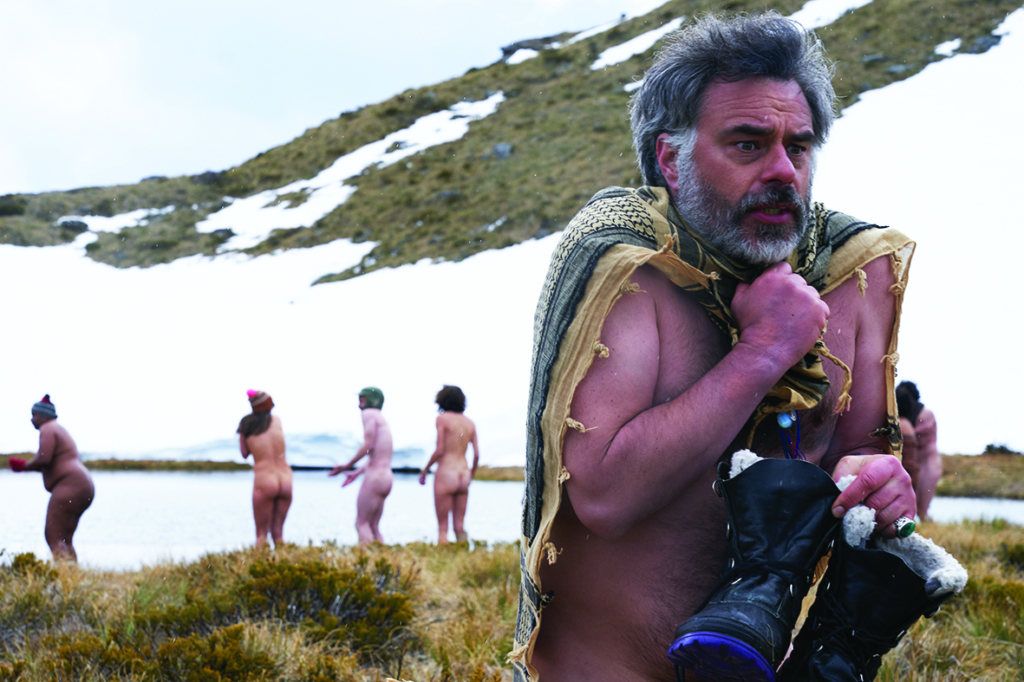
Many of the film’s best sequences come when Clement and van Beek are on screen together. One especially stands out: Laura happens upon Bjorg while he is fishing in a river, leading to an ungainly, somewhat slapstick sexual encounter in which both actors excel. They are interrupted by a phone call Bjorg receives, which Pacquola and Chieng utilise superbly: it is his accountant informing him of problems regarding his facility’s status as a religious organisation, which, crucially, allows a multitude of tax benefits. He loses his temper, removes Laura’s hand from his underwear, kicks the water in rage and storms off. This adds a new dimension to Bjorg, presenting him as profit-minded entrepreneur and businessman – and quite possible charlatan – rather than shamanic sex magician. (In this scene in the Davis version, Bjorg’s phone call is a rather less interesting exchange about a poncho he ordered).
This scene is one of many that beautifully capture the exquisite landscape of the region where Nude Tuesday was shot.[7]See ‘Nude Tuesday’, New Zealand Film Commission website, <https://www.nzfilm.co.nz/international/showcase/nude-tuesday>, accessed 23 July 2022. The choice of settings and framing from cinematographer Andrew Commis is exceptional, with the grandeur of the scenery only adding to the strange dreaminess that is created by both this invented language and the lashings of esoteric ‘hippy nonsense’, as Laura’s mother puts it. The film’s final scene, which takes place on a mountaintop beside a freezing lake (with all characters nude) is particularly stunning, as is a scene earlier in which Laura and Bruno tread through a striking, moss-covered, almost mystical woodland to make an ultimately botched attempt at outdoor lovemaking (failing to live up to the idealised reflections of ‘Greensleeves’).

Van Beek has said that the idea of making the film in gibberish was intended to fit into, and expand, its themes of miscommunication and disconnection.[8]See Richard Martin, ‘Bonkers Kiwi Comedy Nude Tuesday Changes the Script’, 1news.co.nz, 15 June 2022,<https://www.1news.co.nz/2022/06/15/bonkers-kiwi-comedy-nude-tuesday-changes-the-script/>, accessed 25 July 2022. Nude Tuesday is successful in exploring these concepts up to a point, but some of the more serious themes that might be found here (such as, for example, the pressures of work life, the painful struggles of marriage, issues of masculinity and the dubious motives of people like Bjorg) are rather lost in the relentless comedy, both physical and in the subtitles’ quips and one-liners alike. But that need not be problematic. Like ‘Foreign Film Dub’ from Whose Line Is It Anyway? and even, once upon a time, The Canterbury Tales, this is a light, relatively undemanding and thoroughly entertaining diversion – as well as an audacious experiment in cinema.
Endnotes
| 1 | Many clips of this game from both versions of the show can be found on YouTube. For example, see ‘Foreign Film Dub (Italian, Farewell My Porcupine) – Whose Line UK’, YouTube, 15 September 2016, <https://www.youtube.com/watch?v=nacBB91KScE>, accessed 18 July 2022. |
|---|---|
| 2 | There is also a third version available on streaming service Stan without any subtitles at all, allowing viewers to ‘improvise with family and friends’. See Brad Newsome, ‘“Extraordinary TV”: This True-crime Drama Should Be on Your Must-watch List’, The Sydney Morning Herald, 6 July 2022, <https://www.smh.com.au/culture/tv-and-radio/extraordinary-tv-this-true-crime-drama-should-be-on-your-must-watch-list-20220701-p5aya6.html>, accessed 28 July 2022. |
| 3 | The language of Nude Tuesday has been referred to as ‘Zøbftańlik’. See Sam Brooks, ‘The Story of Zøbftańlik, Nude Tuesday’s 100% Fake Scandinavian Language’, The Spinoff, 18 June 2022, <https://thespinoff.co.nz/tv/18-06-2022/the-story-of-zobftanlik-nude-tuesdays-100-fake-scandinavian-language>, accessed 23 July 2022. |
| 4 | The language was formed by van Beek in collaboration with actor and voice coach Perry Piercy, taking inspiration from Scandinavian languages as well as dialects created for fantasy or sci-fi books, film and television, such as Elvish (The Lord of the Rings) and Dothraki (Game of Thrones). See ibid. |
| 5 | See Ian Pittaway, ‘Greensleeves: Mythology, History and Music. Part 1 of 3: Mythology’, Early Music Muse, 3 July 2015 <https://earlymusicmuse.com/greensleeves1of3mythology/>, accessed 23 July 2022. |
| 6 | Nevill Coghill, ‘Notes’, in Geoffrey Chaucer, The Canterbury Tales, trans. Coghill, Penguin Classics, London, 1952, p. 517. |
| 7 | See ‘Nude Tuesday’, New Zealand Film Commission website, <https://www.nzfilm.co.nz/international/showcase/nude-tuesday>, accessed 23 July 2022. |
| 8 | See Richard Martin, ‘Bonkers Kiwi Comedy Nude Tuesday Changes the Script’, 1news.co.nz, 15 June 2022,<https://www.1news.co.nz/2022/06/15/bonkers-kiwi-comedy-nude-tuesday-changes-the-script/>, accessed 25 July 2022. |
